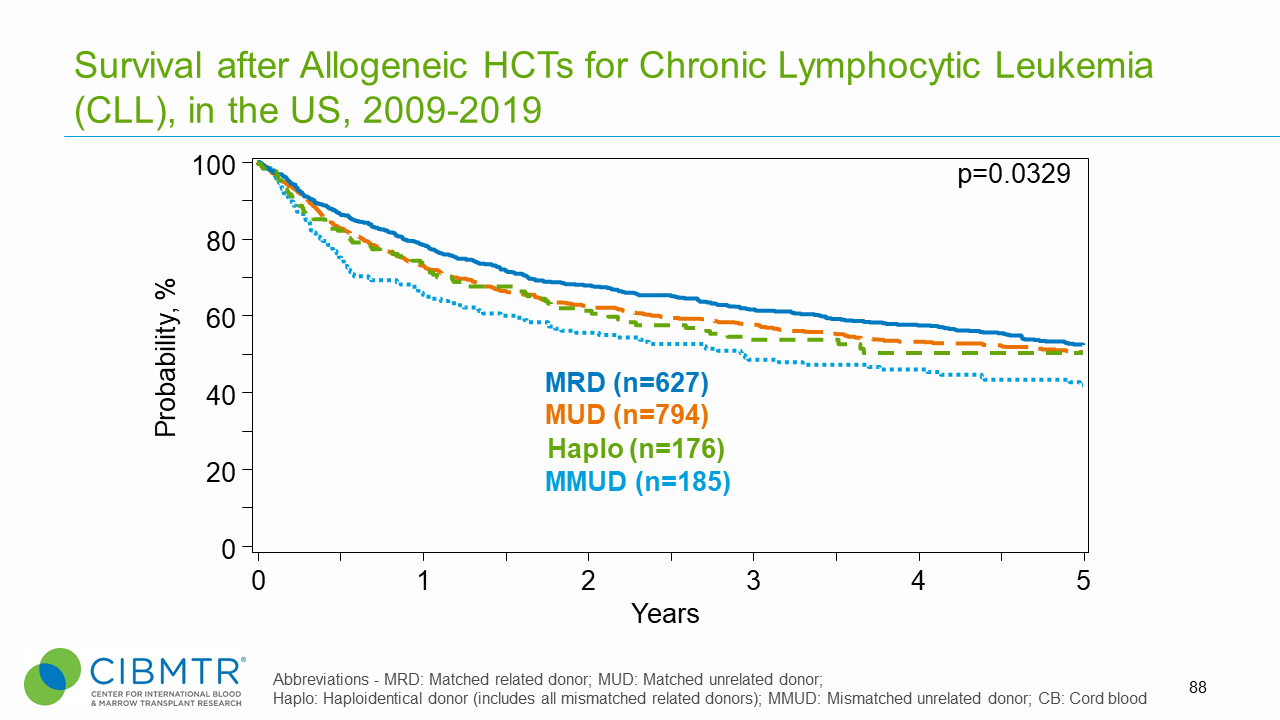Chronic Lymphocytic Leukemia (CLL)
Chronic lymphocytic leukemia (CLL) is primarily an adult disease, with a median age at diagnosis of 71 years. In the United States, about 15,000 people are diagnosed with CLL each year, of which about 60% are male. [1]
CLL is generally an indolent disease, and treatment does not usually begin until a patient has bothersome or serious symptoms such as lymphadenopathy, anemia or thrombocytopenia.
Chemotherapy and/or immunotherapy is a common front-line treatment. Hematopoietic cell transplantation (HCT) is indicated when a patient with CLL relapses after chemotherapy and remission times are short or disease risk factors indicate high-risk disease. [2,3] Allogeneic HCT remains the only curative option for patients with CLL.[2] Approximately 80% of transplants in CLL are allogeneic transplants. [4]
Outcomes
Data in this section have been prepared by the CIBMTR® (Center for International Blood and Marrow Transplant Research®). The CIBMTR is a research collaboration between the National Marrow Donor Program® (NMDP)/Be The Match® and the Medical College of Wisconsin.
Figure 1. CLL Survival, Allogeneic HCT

HCT Consultation Timing Guidelines
The National Marrow Donor Program® (NMDP)/Be The Match® and the American Society for Transplantation and Cellular Therapy (ASTCT) have jointly developed guidelines for transplant consultation and referral timing based on disease characteristics. [5] The National Comprehensive Cancer Network Clinical Practice Guidelines (NCCN Guidelines®) were consulted when developing these guidelines and are a valuable tool in determining risk stratification. [6]
Our guidelines highlight disease categories that include patients at risk for disease progression and who should be referred for a consultation for autologous or allogeneic cell transplantation. [5]
Transplant Consultation Guidelines: CLL
- Resistance or intolerance to BTK inhibitors and/or BCL2 inhibitors
View complete HCT Consultation Timing Guidelines
Clinical Trials Search and Support
The NMDP/Be The Match offers the Be The Match® Jason Carter Clinical Trials Search and Support (CTSS) program, which can provide clinical trial navigation to your patients. The CTSS Program was created to help people with blood cancers or blood disorders and their families find and join clinical trials.
For more information, visit Clinical Trials Search and Support.
References
- Miller KD, Siegel RL, Lin CC, et al. Cancer treatment and survivorship statistics, 2016. CA Cancer J Clin. 2016; 66(4): 271-289. Access
- Lu K, Wang X. Therapeutic advancement of chronic lymphocytic leukemia. J Hematol Oncol. 2012; 5:55. Access
- Kharfan-Dabaja MA, Kumar A, Hamadani M, et al. Clinical practice recommendations for use of allogeneic hematopoietic cell transplantation in chronic lymphocytic leukemia on behalf of the Guidelines Committee of the American Society for Blood and Marrow Transplantation. 2016; Epub September 19. Access
- D'Souza A, Fretham C. Current Uses and Outcomes of Hematopoietic Cell Transplantation (HCT): CIBMTR Summary Slides, 2017. Available at: http://www.cibmtr.org
- NMDP/Be The Match and ASTCT Recommended Timing for Transplant Consultation. Download (PDF)
- National Comprehensive Cancer Network. Chronic Lymphocytic Leukemia/Small Lymphocytic Lymphoma. (Version 1.2023). Access